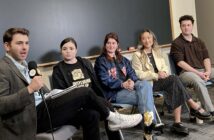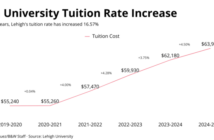Lehigh has hired and is continuing to seek faculty members through synergistic searches to be a part of the Data X initiative.
The Data X initiative, which launched in May 2015, aims to provide students with the opportunity to learn and refine their skills with data analysis across disciplines. The recent increase in demand of data analytics courses from students in various areas of study led to the search for staff members with a wide range of integrated skills.
“We are looking for excellent teachers that can teach courses we already have, and will bring in courses that we don’t have already,” said Daniel Lopresti, a professor and chair of the department of computer science and engineering, and director of Data X.
Lopresti said data is being infused into all aspects of life and all academic areas of study, and the Data X initiative caters to that demand.
“It has changed the way we learn and interact with one another,” he said. “There is no single profession that is not affected in some way.”
It is significant to hire new faculty members who can work across different fields, as it is the interdisciplinary individuals who have made big things happen such as personalized medicine, the development of self-driving cars, and other technological advances that individuals may have not thought possible before.
The faculty search is centered on finding professors to teach digital media, consumer analytics and connective health. The goal is to have these areas of study grow at Lehigh, Lopresti said.
While the top candidates have been hired in the areas of digital media and consumer analytics, there are still searches for faculty in computer science and engineering.
Jeremy Littau, an assistant professor of journalism and communication, said the search for a candidate in digital media was the most challenging and interesting searches he has been involved with.
“We were looking for an intersection between data and media,” Littau said. “Yet in our department, we don’t do a lot with spreadsheets and numbers. A lot of our students dread statistics, but it’s not that our students can’t handle it, it is just that no one has spoken about numbers in a way that is relevant to them.”
Littau spoke of the need for faculty members who can translate data in a way that makes sense to all kinds of majors.
“They need to take those difficult-to-grasp, abstract concepts and figure out a way to translate to groups of people who are not always thinking with data,” Littau said.
To evaluate candidates’ abilities to interact with students and accurately teach about data, potential hires interact with students in a classroom setting.
David A. Griffith, professor and chair of the department of marketing, explained that Lehigh students have attended on-campus presentations given by candidates to evaluate their teaching styles. Students have also met with candidates over lunch, he said.
“We believe that the informal context of a lunch allows a wonderful opportunity to better understand how the faculty member will interact with Lehigh students,” Griffith said. “Are the candidates empathetic? Are they listeners? Do they want to hear about students’ expectations and experiences, or do they want to tell the students about what they do?”
On top of communication skills, members of faculty search committees are looking for candidates who respect different disciplines, Griffith said.
“We are looking for people who have respectful understandings of other areas and as such can identify new points to expand on and grow,” Griffith said.
Bringing in individuals who show consideration for differences and can speak to many areas of interest could lead to new programs that are team-taught or new combinations of classes, he added.
Data X has not only brought an integration of disciplines, but also an integration of people. The search committees, like the array of candidates, are comprised of individuals from all subject areas. The composition of the committees themselves forces members to consider variables outside of their respective fields when assessing a candidate, Littau explained.
The joint-hiring process is also something that Griffith has never experienced before.
“I have never seen a committee where it is equally balanced across disciplines, with people who really want to work in an interdisciplinary space,” he said.
According to Griffith, the Data X initiative and the faculty search itself is bold from an interdisciplinary standpoint.
“We have stayed true to who we are from this belief that bringing people and disciplines together can help us solve and create new things,” he said.






Comment policy
Comments posted to The Brown and White website are reviewed by a moderator before being approved. Incendiary speech or harassing language, including comments targeted at individuals, may be deemed unacceptable and not published. Spam and other soliciting will also be declined.
The Brown and White also reserves the right to not publish entirely anonymous comments.